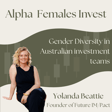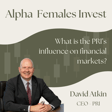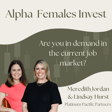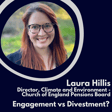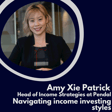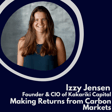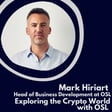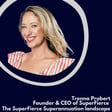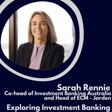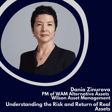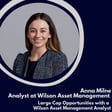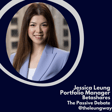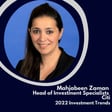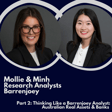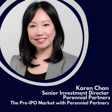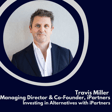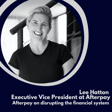Introduction to Alpha Females Invest Podcast
00:00:03
Speaker
Welcome back to the Alpha Females Invest Podcast, two females working in the finance industry searching for alpha. My name is Clooney. And my name is Emily. And together we bring diversified perspectives from the buy and sell side of the finance world.
00:00:19
Speaker
As usual, any information discussed in this podcast is not financial advice. All opinions reflect those of the individuals. You should always read the PDS and talk to a financial advisor who can consider your personal circumstances before you invest. This podcast is intended for educational purposes only.
Guest Introduction: Julian Hewitt
00:00:37
Speaker
So today on our podcast, we have Julian Hewitt. Julian is a private client advisor and broker with Bell Potter Securities Limited. He is accredited to advise in Australian and international equities, level one and two derivatives, fixed interest securities, listed and unlisted managed investment, government bonds and debentures. Julian provides professional, customized advice regarding equity investments, specialising in portfolio management and stock selection for his clients.
00:01:07
Speaker
Because he doesn't think his job is busy enough, he is also currently enrolled in the CFA Program Level 2 and recently completed and passed his FASIR exam. As our listeners are now hopefully very well aware of by now, one of our key goals of this podcast is to elevate our peers' knowledge,
00:01:25
Speaker
especially with regard to managing our personal finances and understanding all the different ways in which we can do that.
Early Career and Role at Bell Potter
00:01:32
Speaker
So today on our show, M&I is super keen to dive into the role and benefits of having a broker. Welcome, Jules, to the show. It's great to have you. Hi, Cleans. Hi, Em. Thanks for having me.
00:01:43
Speaker
So as an avid listener yourself to this podcast, I know you know that the first question we ask every time is a recurring question and it's definitely one of my favorites. So to kick us off today, could you please share with us your most embarrassing career moment?
00:01:59
Speaker
Well, I'm glad there's only one of those I have to share, but I'll definitely kick you off with one. So look, to start off, I think it would be at a starting point in my career when I was a junior or what's called a deals assistant. The deals assistant often has to execute trades or set up accounts or do that sort of thing. But early on in my career, I made a $700 error to the advisor. And little did I know that the error goes onto the advisor's balance sheet. So that was a bit of a shock for me. But I think that serves them right for getting their junior to execute their trades.
00:02:29
Speaker
Anyway, a bit of just desserts. Well, I'm glad that doesn't occur in the in-store world. Otherwise, I'm sure someone could be making $200 million, which, you know, if that was on my balance sheet, I'm sure it would be coming off pretty quickly.
Broker vs. Financial Advisor: What's the Difference?
00:02:45
Speaker
So, Jules, obviously you work with Bell Potter, but for our audience who isn't familiar, can you just give us a brief introduction of what the firm does and how it fits into the financial system?
00:02:56
Speaker
Okay. Yeah. So Bell's or Bell Potter is one of Australia's largest full service stockbrokers. So it's a pretty much a one-stop shop to cater to any client's needs, institutional or retail. I worked in the retail equities division as a stockbroker and client advisor, but there's also an ACM team, an Insta team, Futures, FX, and a whole bunch of products. So really, if you want to do finance, come to Bell's. We'll sort you out.
00:03:20
Speaker
Shameless plug. I love it. Can you give us a bit of background and explain exactly what is the role of the broker? And I guess second to that, what's the key difference between a financial advisor and a broker? Are you guys just a one trick pony or can you offer both services to your clients?
00:03:38
Speaker
Okay, this is a tricky one which I need to be careful how I answer, but I'll try. To simply define the two historically, the role of a broker is to buy and sell shares, whereas the role of a financial advisor is to advise the client what to buy, what to sell, when to do it, and how much. Over the years, particularly following the Hayne Banking Royal Commission, we've seen a bit of a conversion between these two definitions, but one thing becoming the main focus of a financial advisor or broker, can you guys give me a guess? Oh, I'm going to go broker.
00:04:08
Speaker
What's the focus though? If you're an advisor or a broker, what's the main focus?
Why Choose a Broker Over Online Platforms?
00:04:13
Speaker
What's the most important thing? To get the best outcome for your clients. Absolutely. It doesn't matter what you're doing. The main thing is putting your client's interest first. It doesn't matter whether you're broking shares or telling them what to do. The client's numero uno. Depending on what you need to do,
00:04:30
Speaker
I mean, you can put their interests first in different sort of ways. So for me, it really depends on what their needs are. And some of my clients know what they exactly want to do, whereas others really need to be handheld through different situations. And others, I'm simply executing for them and offering my service in that way. Some like to just have the ability to ring up, pick up the phone and ring me and just ask what I was suggesting them and others really needed me to talk them through it.
00:04:54
Speaker
Sometimes a common thought of what a broker is, if you're a buyer, you need to find the seller and find the opposing trade. But I think that originates from the days of the trading floor when that sort of thing actually mattered, where it doesn't now because everything's executed on an exchange, everything's electronic. Most stocks that I deal in for a retail client is particularly liquid. And that sort of thing would only matter if you're dealing with a top shareholder of a small cap company, where you need to offload a larger parcel of shares, or even if you're crossing a larger stock
00:05:23
Speaker
in the blue chip world where that sort of thing is important, crossing a large line of stock, but it's not particularly in the retail world per se.
00:05:31
Speaker
Yeah, that makes a lot of sense. I guess just trying to relate it to our investors. A lot of us are familiar with the different trading platforms where we can execute shares and execute them relatively cheaply. I guess, why would the average person or what are the advantages of using a broker like yourself
00:05:54
Speaker
versus actually just going in and doing the trade themselves through one of these trading platforms. I guess what we're trying to say here is, how do you differentiate yourself in what's a pretty competitive market at the moment?
00:06:07
Speaker
Yeah, good question. I think the key thing in terms of value proposition, what clients are after is the advice. If you know what you're doing and you're a smaller punter, I mean, typically you can really get that service through an online broker and my services are not really needed.
00:06:25
Speaker
But if you're dealing with yourself on a super fund or larger savings or just an investment account, really where I can value add is by giving clients advice. A lot of people don't have the time to monitor market movements or corporate actions or that sort of thing.
00:06:44
Speaker
Yeah, it's really the advice component and what degree of advice that the client needs, whether it's just a little bit of handholding, whether it's asset allocation or whether it's just my opinion, some people just want to pick up the phone. I would also argue that I can execute better than the individual punter on an online broken service because I see a live market can execute trades clearer than someone operating on an online platform.
00:07:12
Speaker
Yeah, it's an interesting point because I guess in some of the micro-investing or micro-trading platforms, sometimes you don't actually see the underlying price that you're getting. There's a little bit of lack of transparency there. So I guess what you're saying is you can see the market and really got best execution for your clients, which can roll through to the performance of the trade.
00:07:33
Speaker
Yeah, absolutely. And I mean, if it is larger sums of money, if we're talking in a stock that deals, say $100,000 a day, if you're dealing in a lot of the volume of the day, then you can really impact the market and a typical person who deals in that stock might move that without knowing and really worsen the price and paying that sort of higher amount of brokerage, you're going to pay more in paying the higher price.
00:07:56
Speaker
I think that's a really interesting point as well. I think the other key aspect to that is that advice component.
Choosing the Right Financial Advisor
00:08:02
Speaker
Even though M&I both work in finance, we potentially don't know how we should structure a self-managed super fund or a portfolio for our own needs in the future. I think that point is really pertinent.
00:08:14
Speaker
I'm sure when the time comes that we have self managed super funds, we'll be looking into all the different types of alternatives. So I guess like going on from there, you know, if people do wish to seek financial advice, how should they go about choosing an advisor in your opinion?
00:08:29
Speaker
Well, I think a good starting point is going to the ASX website. You can bring up a list of all the different brokers, whether it's full service or online, and then just going through even familiar names, which would be a good starting point, and then go by ringing up, finding a suitable advisor. If you're new to the finance industry, I'd really recommend a face-to-face meeting just because
00:08:51
Speaker
It's where you're handing over your hard-earned money to someone to invest, and it's really about building that trust with someone. Some people can do that thing over the phone, but I'd really suggest meeting face-to-face just to get in front of them and see the whites of their eyes, so that would be my
Emotional Investing: How Brokers Help
00:09:08
Speaker
recommendation. I just want to point on the earlier question I just thought of. If you're investing your own money, it can be quite emotional, whereas if you have a broker or financial advisor, you really can
00:09:20
Speaker
have them manage the emotional component of it. And when you become emotional with investing, you can sell in the wrong moments or buy in the wrong moments. Whereas if you have that third party, just to give you a bit of guidance that can often save you multiples of the fee you're paying them. So that would just be another point I'd mention.
00:09:39
Speaker
No, that's a really important point, particularly when I know in my personal trading, there's always been circumstances where I've sold too early or not bought enough or gone in hard enough. And I think it is that emotional roller coaster, you start to see it.
00:09:54
Speaker
trending down and the market freaks out. And so you pull your money when really the best thing might've been to leave it in there. So I think that's super important because we're all highly emotive when it comes to our own money and our returns and just our psychology when it comes to money is fascinating. We hate losses more than we like gains. So it is really important to have an external party, I guess, assisting.
00:10:16
Speaker
Well, a good analogy is actually, if you're at the supermarket, typically people go for what's on sale, but it's not that in the
Investment Timeframes and Expectations
00:10:22
Speaker
share market. People usually freak out and not go for the shares that look like bargains, but the opposite when you're in the shops. But anyway. No, that's a really good one.
00:10:31
Speaker
So I guess we wanted to ask a little bit about your client's behavior. So what's the typical timeframe that a client might invest with? Do you have clients that are short term and both longer term holders? I guess what's your key client or is it all about what depends on the best outcome?
00:10:50
Speaker
Yeah, look, I mean, it really depends. I mean, some clients will come to me just to use my execution services and that could be to sell some shares that they've inherited from a deceased family member or other people come to me with a parcel of money that they've inherited and they say, look, I want to buy some property and I'm only in the market for a year.
Short-term vs. Long-term Investment Strategies
00:11:09
Speaker
And when you get these narrow time frames, that's when it can be a bit risky because I don't know what's going to happen tomorrow in the markets. And anyone that does, I think, is sort of talking through their ears
00:11:20
Speaker
So you've really got to sort of manage your client's expectation with a timeframe and be quite reasonable. And with equity markets, as we know, they can go up and they can go down and managing that risk with your client is very important and just to manage their expectations too. So I mean, typically a client, I would say you wouldn't want to promise anything in less than say one to three years, just because you don't know what's going to happen around the corner and I don't. So
00:11:47
Speaker
Given that shorter time frame, you can manage the portfolio from an asset allocation perspective accordingly and also manage their risk. If some client is looking for a shorter time frame, say one to three years on the basis they want to purchase a house, which is what a few of my friends are saying to me, I've really got to say, well, look, if it is for a house, do you really want to be in the equity markets and risky capital? Sometimes it is better off not going into the markets on those sorts of things, but other clients who are managing
00:12:15
Speaker
larger amounts of money and it's to supplement their income, they can bear market risk and be rewarded in the longer term. Yeah, I think it's interesting and I do think there's definitely with a lot of new and innovative financial apps or trading systems out there,
00:12:34
Speaker
There's becoming, I think, a bit more of the mentality of quicker turnover, but I guess if you look back on history and you do see all the statistics, it does seem buy and hold is the way to go. Particularly, a lot of people we know started investing in the lows of March 2020 and they've had a pretty good investing experience to date and they haven't had to weather a storm yet.
00:12:58
Speaker
I have friends who are looking at wanting what to do with their house deposit and they're like, oh, well, equity markets, it's worked for me so far, so I might as well put all my money in there. But I guess, again, coming back to that emotive response, you need someone to kind of say, actually, this might be a better investment option for you. Yeah, absolutely. Well, I think people that bought in March last year were very lucky and they just nailed it. Buy low, sell high, that's all you got to do. It's actually pretty simple.
00:13:24
Speaker
Yeah, I think you'll be out of a job pretty soon if that's all you got to do. I reckon we can end the podcast there.
00:13:32
Speaker
Jules, for your background, we have spoken about the benefits of passive investing with a few of our guests, but specifically Sarah from Stockspot. I guess, obviously, being a broker, you would encourage active investing. Perhaps I'm wrong, but in your opinion, what are the key benefits of active investing?
Active vs. Passive Investing
00:13:50
Speaker
Do you have a dual approach here or are you solely for the active side of the equation?
00:13:57
Speaker
Yeah, look, it's interesting question. I think sort of by definition, engaging someone like me to manage a portfolio or any wealth advisor or stockbroker is to some degree active management. But as an active manager, I like to incorporate passive funds within the portfolio to give that
00:14:18
Speaker
stability of index returns and you can't really argue with an index return because it's what the market did and that's performed so you haven't underperformed and you haven't outperformed. It's interesting, I was on a call today with Vanguard who do a lot of passive funds and really low cost funds and that's probably one of the benefits that I like because over the longer term, your returns aren't eaten away by fees and Vanguard are very good because of their size at reducing
00:14:46
Speaker
the impact of fees on the returns. Whereas the benefits of active investing, and you can also achieve this through different funds and ETFs. I think you can pick up sort of thematics and different areas of the market which are running. So in particular, I looked at one today on semiconductors. So I mean, that could be an area that's very topical at the moment, and I think will be over the coming years. So that's really one way you can try and add value to clients portfolios.
00:15:13
Speaker
Yeah, and I guess, I mean, you kind of already answered our next question, but we are hearing that a lot of people are more and more interested in ETFs as a way to get a diversified exposure to, like you mentioned, certain themes or to a benchmark or even to active management like our previous guest.
00:15:32
Speaker
I guess, are single stock names still driving the majority of the retail market or are you seeing ETFs and fund management portfolios becoming more important?
Global Investments and Diversification
00:15:44
Speaker
I think it really depends on the size. A typical client I would have on is no less than, say, a quarter of a million dollars, but often or not, we might get relatives of the client or their children or someone that doesn't have a quarter of a million but still wants to engage in the market, in which case we're going to take them on as a client.
00:16:05
Speaker
ETFs and exchange rate of managed funds are very good ways to get that level of diversification without having to choose individual stock names. If I'd produced a portfolio for a quarter of a million dollars and there's 10 stocks, you can get 10 stocks at 25 grand a piece and you get a good amount of diversification.
00:16:25
Speaker
whereas if there's a portfolio of 50,000 to get 10 stock names, you're really going to get eaten away on fees for that size portfolio, which is where an exchange traded fund can supplement that well. There's uses for both. There's uses for ETFs in large portfolios, and there's uses for individual stock names in small portfolios too, and it really depends
00:16:48
Speaker
I think that's an interesting one. I think the rise of the retail army that we saw as sort of mentioned more probably beginning of this year with GameStop. That clearly was a single name stock that just had an extraordinary ride. I think there's definitely questions that that raises around
00:17:09
Speaker
you know, people providing advice versus someone just going and doing something themselves on an app without sort of, I guess, potentially the background behind that specific company or how it runs itself. So I guess in moving on a little bit, you know, I do think even though our podcast isn't global yet, we obviously love to speak about global investing trends.
00:17:30
Speaker
And I'm sure one day the podcast will be a global investing trend then. But are your clients able to invest globally through you? Does this add an additional layer of costs? We have seen a lot of businesses start up recently that really promote the ability to enter global markets. And I think for those that are potentially not in the know, that hinders their thought process on whether they're able to invest globally, you know, with a domestic broker. So I'm just interested to hear your thoughts around investing globally versus locally.
00:18:00
Speaker
I mean, when you go to uni, you do what's called an asset allocation. Everybody knows that you don't need a double degree to work it out. Very, very simple. So I think every portfolio needs a global part or an international part of its asset allocation. If you ask any portfolio manager, that's what they'll say. So adding it into a retail client's portfolio, I think is just as important. But do you need individual stock names?
00:18:22
Speaker
on a retail client's portfolio globally? If it's large enough, I think yes. But I think in an everyday person's portfolio, you can supplement it well through the use of a fund. But if you really want to go that extra level and invest in an offshore
00:18:38
Speaker
name like Taiwan semiconductors or Apple or whatever the company may be, you can definitely do it. And you can do it at Bell Potter. I'm not sure every broker does it, but that's one of the benefits of a full service stock broker is being able to invest in an individual or a direct equity offshore. And you need quite a good platform to be able to do that. So in our instance, Citibank's our custodian who holds the international stock, but it is a bit more convoluted to get a direct holding in an offshore investment.
00:19:06
Speaker
And does that increase the cost of my portfolio if I did want to invest globally in a single stock name versus a managed fund? I mean, the brokerage rates are comparable. So in that regard, the cost is relatively the same, but you've got foreign exchange risk and that could inadvertently turn up as a cost in the portfolio if the currency moves against you and it can really eat away at your returns if the currency goes against.
00:19:33
Speaker
Yeah, that's something that I think people maybe don't think about when they're investing overseas is that then they do introduce that FX risk, which is something they really do need to consider as well because it can eat away at your returns.
00:19:46
Speaker
So moving on to kind of a different theme, I guess we wanted to talk a little bit about the IPO market, so initial public offerings.
Understanding IPOs and Pre-IPO Funds
00:19:54
Speaker
Can you tell us what a pre-IPO fund is and how does having a broker help to facilitate these types of investment options for your clients?
00:20:04
Speaker
Well, I might just start off with a pre-IPO. And what it is, a pre-IPO is a pre-IPO fundraising round, which is done to help take a company to IPO. And usually, there's a lot of costs involved in taking a company through to IPO, like Lodging Prospectus with ASIC, and getting all those pre- or junior company stage
00:20:26
Speaker
costs up and running. So a pre IPO fund is a fund that specializes in these junior companies that are ready to list. And often or not, this can be a US thing. And it's been quite popular in the US, particularly with different hedge funds. But there is a way to do it here in Australia. And it is sort of new to the Australian market, but it would form what's part of an alternative asset allocation for clients portfolios. And I think a typical retail client doesn't really have room for this part in their
00:20:54
Speaker
asset allocation because it is a bit exotic if you want to put it like that to an everyday client. I'd probably warn your everyday person from a pre-IPO fund just because of the risks involved in the types of companies they would invest in.
00:21:10
Speaker
So continuing on the IPO front, there's been more than 80 listings on the ASX this year alone. We've seen some really successful listings performing well in the aftermarket, but also a number of challenged ones. I guess when assessing an IPO's suitability for a client, what are the key things you are looking for?
00:21:30
Speaker
Okay, Cleans. Look, I think there's so many different reasons why a company lists and what you should look for if you're going to invest in a company that is listing on the stock market. But I've come up with six reasons that are sort of good checkpoints to look at when a company is listing. So I think the first thing you can look at is the vendor. So what type of company is it? What the management team are doing? And sort of do you understand the business because that's quite important to me as an investor or when I'm investing on behalf of my clients, you've really got to
00:21:56
Speaker
understand the business because sometimes you can get companies that list and they even go over my head. Why are we trying to invest in a company and get a return on something that could be a little bit off-paced and might not really meet a client's investment thesis? The second thing is who are the brokers on the deal? You couldn't get a really small company, but if it's got a really off-paced broker that's not on the deal that you've never heard of, the credibility might not be all that great.
00:22:23
Speaker
The next one would be listing reasons why is the company listing on the exchange is it to provide liquidity to existing shareholders so they can exit or are they putting more money in. I'd look at how the deals price is it looking expensive is it cheap that's where you can try and research involved what the demands like for the stock is it.
00:22:42
Speaker
I'm really oversubscribed IPO is there not much demand for that's very important and the sector in the market so is it listing in favorable conditions for its particular sector i think would be quite important the next one i just mentioned is if you've got a good relationship with your broker they'll be able to give you color on the above six points they're not yes no questions but.
00:23:03
Speaker
answering those questions will help you formulate whether or not it's a good deal. And if you could get a clear understanding of those six points, you'll probably get a good idea on how the deals going to go.
00:23:13
Speaker
Yeah, it's interesting. And I think we kind of as investment managers, we look at a lot of the similar things as well as to whether we will participate in a deal. So that's quite interesting. Absolutely. And I think it's different from the institutional land to the buy side land to the retail land, because we're all looking at different components to it. You guys are probably cornering deals. We're just adding in shareholders and names into the book. But I think you've got to look at it in its entirety.
00:23:41
Speaker
Yeah, no, it's a great point. I guess moving on to yield.
Dividend Yields: What Clients Need to Know
00:23:47
Speaker
So there is some yield seekers out there, so stocks do sometimes have a dividend yield. I guess why is this relevant for your clients or retail investors? What is dividend income? And why would an investor seek to get a high dividend stock versus capital gains?
00:24:09
Speaker
I think typically a client after yield is a client that wants dividend income to supplement their lifestyle. Not always, but that can be the main reason. So when you think about people who need dividends to live, you think of here in Australia, self-funded retirees who really love dividend paying stocks and really love franking credits.
00:24:30
Speaker
Some people like dividend paying stocks because it means the company is mature, it's doing well, it's paying out their earnings, and that's a good sign of a quality business. Whereas other people like to invest in stocks that are reinvesting their earnings as opposed to paying out their dividends. So typically I reckon that a client that likes dividends is a bit older and living on the dividends, but it can also be a judgment call on what type of company you want to invest in.
00:24:58
Speaker
But what about like, if we think about where else we can get yield in the market, I mean, we, we struggled to get it in a bank account because interest rates are so low. So is a high yielding stock or a high yielding portfolio, I guess an alternative to having, you know, your money in a bank account or because there's that additional equity risk, is that not a good idea? Yeah, I think it's just something you've got to weigh up and
00:25:27
Speaker
Stepping into equity market for the search for yield is probably a big step up from, say, cash in the bank or term deposit. And I think you guys did an episode recently on fixed income, which is sort of if you're exiting cash in the bank, that's where you would go before you go to equity markets. And then equities, you're probably paying the most in terms of a dividend yield.
00:25:48
Speaker
So yeah, it's all about taking those steps up in risk and being able to understand those steps up in risk. And when you buy a stock for yield, you have to understand that you're risking your capital in the process. And if you stick in good quality stocks that are not up in their earnings by strong cash flows and all that sort of stuff, you can reduce the risk as opposed to buying a stock that has a typically high dividend yield and end up in a yield trap.
00:26:17
Speaker
I guess on a similar vein then, I often hear people talking about, especially in the Australian market, franked versus unfrank dividends. And as I look at it, I always sort of don't really get the benefit of either or the difference. And it's probably because I haven't done enough research into it. So can you explain the key difference and why retail investors are so focused on acquiring franking credits?
00:26:40
Speaker
Yeah, so when you get a franking credit, you get the benefit of the franking credit paid back to you when you do your tax return. Now, the benefit is most in a zero tax environment. So that's a self managed super fund. And that's why I mentioned earlier that self funded retirees are the ones that really
00:26:58
Speaker
derive the most benefit from these franking credits and the franking credit occurs when the company already pays tax first and then you're paying tax on that dividend and that's why you get the benefit back from the franking credit. So if you have a really high marginal tax rate, the franking credit
00:27:14
Speaker
that benefit won't be as great as if you're in a low or zero tax environment. And that's why the self-founder retirees are the ones that really want that. It's almost like a chase in the market for yield. And that's what sometimes pushes the market up as well. Yeah, great. Thanks for talking us through. It's definitely something that I kind of don't know enough about. And that was a good overview. So look, ESG, we love it. We talk about it here.
Emerging Trends: ESG Investments
00:27:42
Speaker
What I would be really interested to hear from your perspective is to whether your client base is actually choosing to avoid or to invest in stocks due to ESG considerations. You mentioned most of your clients are $250,000 portfolios and above, and I'd be interested to see if that group of people are interested in ESG and asking about it.
00:28:07
Speaker
Yeah, look, I think it is an important question to ask. And it's definitely what I'm starting to get inundated with. And I think a lot of with people's portfolios, they want to get exposure because they know it's being talked about. And whether or not they think it's an important thing or not, they know that the market is going that way anyway. So I am getting consistently inundated with calls on how to get exposure to ESG. But one of the things I'd say I typically do get a call about that clients will get confused is
00:28:37
Speaker
They'll say, can I get exposure to ESG? And then they'll ask why it's not to do with a direct renewable energy company or a solar panel company. And it's about clearing up the difference. Well, no, you can have a fund that does ESG that is just the top 10 stocks in Australia, which is not necessarily renewable energy.
00:28:59
Speaker
But it's just about having the ESG component and having the management team do their thing and doing the carbon credits and all that sort of stuff to make sure that they're doing their bit to meet their ESG requirements. So I guess educating the retail client base on that difference is quite important. But I think, yeah, it's becoming the forefront of a lot of clients minds and just forming that ESG asset allocation to their portfolio, I think would be a big part.
00:29:26
Speaker
Yeah, we've definitely learned that ESG can mean a lot of different things to different people. So it is all about that educational piece.
00:29:33
Speaker
It's really interesting, Em, hearing Jules's response to that, I guess, from someone that doesn't come from an ESG background. And we've had a lot of people on the show, not a lot, but obviously yourself and Nick Barco, when we did do an ESG episode, those different perspectives about what is ESG and what it means to have ESG within a fund and a portfolio is just so varying. So I totally understand how the average investor just gets very confused by the concept.
00:29:59
Speaker
You know, I've obviously learnt a lot more about it as we've gone through this journey. But I guess if you took me back six months ago, I would have little to no idea. So I think it's really interesting everyone's different perspective on it. I guess getting to sort of the end, but not nearly the end. Obviously our listeners
Current Retail Investment Trends
00:30:16
Speaker
see that you deal with a myriad of different people every day and you have numerous clients. Can you give us a bit of an insight into where do you see the most demand for at the moment? What are the retail cohort most interested in right now? And I guess second to that, what are some of the most bought stocks in Australia and do you still see upside there?
00:30:37
Speaker
Great question, Clunes. Look, I think a typical retail investor, there's a lot of focus on the top end or the top echelon of the ASX. So looking at the ASX 20, because that's really where the quality businesses are found. The biggest companies, the banks, the miners, Wesfarmers,
00:30:56
Speaker
and now afterpay and any stock that's been big enough to get through to that threshold. So I mean, for a typical retail client, they're the sorts of stocks that we're talking about on a daily basis and trying to look at those stocks that we think have value. In the current market, I mean, there's a lot of talk about China and geopolitical tensions and iron ore demand and supply. So I've personally have had a lot of clients dealing in those sorts of stocks. And that's where a lot of the dividend paying stocks have been.
00:31:23
Speaker
with the iron ore price so high. So I mean, iron ore has been the topic of conversation for a while now with clients and just trying to focus on getting quality blue chip businesses at a good price and trying to find thematics in the market that will be around for years to come.
00:31:39
Speaker
Yeah, that's great insight. Thanks, Jules. Just before we ask our standard final question, I just was interested to know if our listeners were interested in getting a broker. Would someone like myself or Clooney be a good client to reach out to you? I mean, we have potentially a little bit of money that we could invest, but we might not meet that $250,000 mark.
00:32:03
Speaker
Is that a situation in which we could use someone like yourself? And if so, how would we kind of get in contact? Yeah, absolutely. I mean, there's no real minimum to invest or open an account at Bell Potter. So I think just opening up the door for a conversation is a good starting point. And you can certainly pick up the phone and give me a call or send me an email if you did want to contact me or anyone at the Bell Potter team.
00:32:29
Speaker
that's very easy to do and I think yeah just getting that first step in making the call and even if it's not with a full service broker it could just point you in the right direction to understanding a bit more about the market and helping your own financial knowledge.
00:32:44
Speaker
I think your last point there about just getting in contact with someone and starting a conversation is really where you sort of hit your straps to begin with. And I know you haven't been in the markets for as long as some of our speakers, but you have been in for a little while. So we always love to end our podcast with a question that we ask every time as well. So can you give us your top career tip?
Career Advice for Aspiring Brokers
00:33:07
Speaker
Well, I think the number one thing I would say is persistence and just being able to stick at it. So no matter what you're doing,
00:33:14
Speaker
you'd just be surprised with which people you'd meet, no matter where it is, whether it's in the office or at a barbecue on the weekend, you never know who's going to be your new client or next person you'll meet who will just point you in the right direction or be a mentor. So just keep being social and keep at it.
00:33:32
Speaker
That sounds like hashtag networking to me, Clooney. What do you reckon? I think that's definitely hashtag networking and hashtag being social post COVID. Can't wait to hashtag be social. Absolutely. Great. Well, that was such an insight for episode. I guess it was probably one of our more high level overview.
00:33:53
Speaker
episodes that we've had, but that was actually really useful just to get context on how all of the different episodes of our previous guest kind of fit into the larger picture. So that was really good. And I learnt a lot about the considerations that go into creating a portfolio as a whole and yeah, really valid your insights. So thanks so much for coming on Jules. We love to have you. Oh, pleasure. Absolute pleasure. Thank you, girls. Thanks, guys. Have a great evening.

